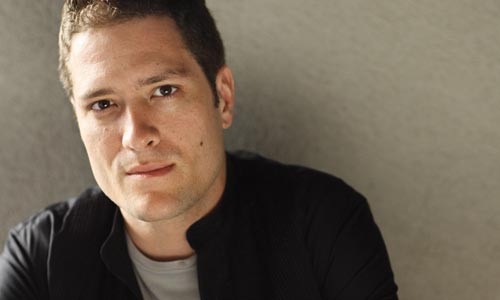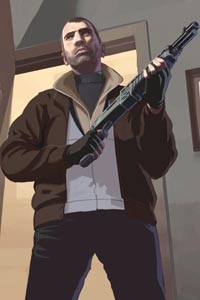If you saw Michael Hollick walking down the street, you'd never think he was capable of wiping out a whole city block. In fact, you probably wouldn't even realize that Hollick, a 1995 graduate of Carnegie Mellon University, could be the most famous celebrity to come out of Pittsburgh in decades. Bigger than Jeff Goldblum, bigger than Michael Keaton. Maybe even bigger than Mr. Rogers -- though with any luck, the character Hollick plays will have less influence on your kids.
Hollick is the voice and animating spirit behind Niko Bellic, the gun-toting protagonist of Grand Theft Auto IV, likely the most popular video game of all time. Released this spring, the game racked up an estimated $300 million in sales on the first day -- roughly three times what the latest Indiana Jones film earned in its opening weekend.
Like its predecessors in the Grand Theft Auto series, GTA IV has been criticized for its treatment of violence, women and ethnic groups. But it has also received critical acclaim, thanks in no small part to Hollick's representation of Bellic, whom a New York Times reviewer called "one of the most fully realized characters video games have yet produced." Players guide Bellic, a Balkan criminal, on a search for revenge through "Liberty City" (a stand-in for New York) -- following a script the Times compares to a mystery by Elmore Leonard.
Hollick provided Bellic's voice (including a full range of screams necessary to dramatize the many ways Bellic can be killed). He also blocked out Bellic's movements, performing in a "motion-capture" studio where computers record actors playing a scene; designers later use the live-action movements as the basis for animation.
Today, Hollick, who has also played roles on NBC's Law & Order, may be the world's first video-game celebrity: His portrayal prompted a May 21 Times story about whether video-game actors are paid fairly. Hollick was paid $100,000 for 15 months of work on the project, but video-game actors do not receive royalties or residuals. "Had this been a television program [or] a film," the Times reported, Hollick and the rest of the cast "would have made millions by now."
The game's developer, Rockstar Games, has barred Hollick from talking about the New York Times piece. But via phone from Sacramento, he was happy to talk about Bellic, video-game culture, and how studying theater in Pittsburgh helped him become the 21st century's most famous gunslinger.
CP: I'm guessing that when you graduated from CMU, you didn't expect to be starring in video games. Did you play video games back then?
MH: I was into video games back when it was rectangles shooting rectangles at other rectangles. Until GTA 4 came out, I wasn't much of a gamer. I will say, though, that the experience of making the game, and also now having it at home, has changed my mind.
So, have you finished the game yet?
I'm pretty bad. I'm still getting the hang of the controller. I think it's hysterical that if the guy who plays Niko Bellic is actually behind the controllers, he'll die in three minutes. I like the driving, though -- putting the pedal down, weaving in and out of traffic.
Do you ever run people over, just for kicks?
I'm a very safe driver, I don't like to take a lot of risks. I think that's why I like being an actor, because I'm able to take all the risks onstage. So I do find myself in the game sometimes -- especially driving -- going for broke.
But it's interesting: A lot of players have told me they get emotionally invested in the character, and they try to play as Niko would play. They don't go on mass-murder trips. It's a testament to the writing, and what we were able to do with the characterization.
I think maybe a lot of times [game designers] don't want to give you too much in terms of characterization, because they want you to apply your own imagination. But if you do give them a lot of character to work with, it opens up all kinds of other worlds.
You've played Niko once already, when you were making the game. So when you play the game, do you feel like tweaking the character?
I kinda do. What's cool about the game is they put you in moral dilemmas: As you're about to take an action, whether it's good or bad, you have to deal with the repercussions. Where this video game has got me -- someone who was not excited about video games -- is that aspect of making people think. As an actor who graduated from a conservatory program, that's what art is about.
Tell me about that program. When you were at CMU, were there professors or productions that really stand out?
Absolutely. There was a black-box theater there: I did a production of Guernica and Picnic on a Battlefield, by Fernando Arrabal -- two one-act absurdist plays. We got to do things that are only done in a conservatory program. You felt free to create and explore these rich, crazy texts.
Don Wadsworth [who teaches voice and dialects at CMU's school of drama] was a huge influence on me. The dialect I did for Niko was based on a Serbian dialect, [and] Don was basically the person who trained me in dialects. ... I [also] worked with a dialect coach during the making of the game, and listened to a lot of native speakers and recordings, and that was primarily how I got into the character.
At the beginning of the game, Niko's dialect is thicker. But as the game progresses, as Niko becomes more comfortable with Liberty City, he becomes more confident with the language. His sense of humor comes in. Niko's cadence tends to be very flat, which leads to his sense of humor being very dry. Those are things that I found helpful in creating the character.
Have you ever done a role that required a Pittsburgh accent?
No, but [instantly adopts a Jim Krenn-worthy accent], "You know you go dahn ere to East Liberty, and it's pretty easy to slip into one."
Maybe that could be your next role: You could go shoot up a Primanti's or something.
[Laughs uneasily]. You know, I think Pittsburgh is beautiful for film, and I also think the dialect and all these interesting things could lead -- and have led -- to interesting films. I'd love to do a film in Pittsburgh, and play a local.
So is it more satisfying to watch yourself on a video game, or in a rerun of Law & Order?
GTA IV has made history, and I'm extremely proud to be a part of it. I did the motion-capture for Niko as well as the voice, which was rewarding as well. A lot of times they'll cast an actor for the movement and a separate actor for the voice.
But what excites me about doing film and TV is that I won't be behind the veneer of animation, but have the full performance being seen, naked in front of the camera.
Yeah, this is weird: They used your voice and movements, but not your face --
I think there was a model, someone else's face they used. But the facial animation -- all of the facial movements were mine.
That concept blows my mind: seeing your facial expressions on somebody else's face. Isn't that bizarre for you?
It is. I can't deny it. The whole experience is weird. You're in a studio with sensors on the walls 360 degrees around you. And you have your motion-capture suit on, which has reflective Styrofoam balls at the points of articulation -- your elbows, your knees, your shoulders. When light is shown on these balls, they reflect back to the sensors, which capture the movement of the balls, and the computer basically adds it all up.
So it's you and other people in a room, wearing outfits with foam balls on them ... you could almost be back in CMU, doing absurdist theater.
Absolutely. Even the tables and the doors -- you can't have a solid table, because the sensors would not be able to pick up your movement under the table. Or if you're coming through a door, it wouldn't be able to capture your motion if the door was solid. Everything was just an open frame.
But one of the great things about this medium is that it allows [designers] to create kind of a Frankenstein-monster creation: They can use the face of this person, the motion-capture of this person, the voice of this person. The visage they used for Niko -- I have some of the same Eastern-bloc background, but I think his face was more appropriate.
Because you don't look bad-assed enough?
Exactly. But I will say this: If you look at Andy Serkis [who played Gollum in the Lord of the Rings movies], he was brought on originally just to be a stand-in, so the other actors weren't staring into space. He was going to be animated over, but he did such a good job with the character that they used his voice, and adjusted Gollum's appearance to have aspects of Andy Serkis' face. The lesson is that when you fuse [the technology] with the actor, amazing things can happen.
Was auditioning for the game like auditioning for a film? And going into it, were you thinking, "Great -- I'm trying out to be a rectangle shooting at rectangles"?
The audition was pretty similar. I read through a couple scenes, they directed me to make some choices, and I went through the scenes again, and that was it.
I did feel like there was going to be a ceiling on what was going to be required of me as an actor. But once I was cast, I recognized that the scenes were excellent. The characters were rich, there was humor. I got excited, and as the process went along, the character got better and better, and the scenes were really cinematic. For me the most important thing, regardless of the medium, is that it has good storytelling, it has value socially and it allows me to have fun.
You mentioned social value, but I'm sure you've heard people say, "People beat up hookers in that game!" Did the violence in Grand Theft Auto give you pause?
I certainly was aware of the controversy surrounding not just this game, but games in general. The same argument is made toward violent films and TV, and I can't discount completely that there is too much violence. But there are ratings on these games, and ideally only people who are old enough will play them. I realize that that isn't always the case. But again, this is based on my own experience and comments from fans: Because the characters are more fully fleshed out, you don't just perform these despicable acts, chuckle and drive away. Maybe some people do, but I think there is more value in the content. That's why it can't be written off so easily as a violent video game -- and why it has been so critically acclaimed.
If the next Grand Theft Auto were set in Pittsburgh, what landmarks do you think would have to be included?
There'd have to be a chase scene up and down the Cathedral of Learning. You could do so many cool things with the bridges, and down at the Point: You could definitely take out the boats there. Or land a helicopter at the 50-yard line at Heinz Field.
Anything you'd want to blow up?
No, I love the architecture in Pittsburgh, the Gothic feel of some of it. I can't say anything would be deserving of blowing up. Even just for fun's sake.




















